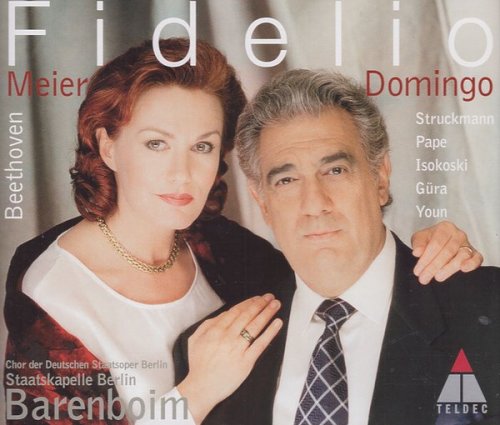
Daniel Barenboim – Beethoven: Fidelio (2000)
BAND/ARTIST: Daniel Barenboim
- Title: Beethoven: Fidelio
- Year Of Release: 2000
- Label: TELDEC
- Genre: Classical opera
- Quality: FLAC (image+.cue,log,scans)
- Total Time: 02:38:54
- Total Size: 708 MB
- WebSite: Album Preview
Tracklist:
CD 1
01. Ouvertüre to Leonore No.2, Op.72
Aufzug 1:
02. Arie "O wär' ich schon mit dir vereint"
03. Duett "Jetzt, Schätzchen, jetzt sind wir allein"
04. Quartet "Mir ist so wunderbar"
05. Arie "Hat man nicht auch Gold beineben"
06. Terzett "Gut, Söhnchen, gut"
07. Marsch
08. Arie mit Chor "Ha, welch ein Augenblick!"
09. Duett "Jetzt, Alter, hat es Eile!"
10. Rezitativ und Arie "Abscheulicher, wo eilst du hin"
11. Rezitativ und Arie "Komm, Hoffnung, laß' den letzten Stern"
12. Finale "O welche Lust"
13. Finale "Nun sprecht, wie ging's?"
14. Finale "Leb wohl, du warmes Sonnenlicht"
CD 2
Aufzug 2:
01. Introduktion und Arie "Gott! - Welch Dunkel hier!"
02. Introduktion und Arie "In des Lebens Frühlingstagen"
03. Melodram und Duett "Wie Kalt ist es"
04. Melodram und Duett "Nur hurtig fort, nur frisch gegraben"
05. Terzett "Euch werde Lohn"
06. Quartett "Er sterbe!"
07. Duett "O namenlose Freude!"
08. Finale "Heil sei dem Tag"
09. Finale "Des besten Königs Wink und Wille"
10. Finale "Wer ein holdes Weib errungen"
Ouvertüres:
11. Ouvertüre Leonore Nr. 1, Op. 138
12. Ouvertüre Leonore Nr. 3, Op. 72a
13. Fidelio: Ouvertüre
CD 1
01. Ouvertüre to Leonore No.2, Op.72
Aufzug 1:
02. Arie "O wär' ich schon mit dir vereint"
03. Duett "Jetzt, Schätzchen, jetzt sind wir allein"
04. Quartet "Mir ist so wunderbar"
05. Arie "Hat man nicht auch Gold beineben"
06. Terzett "Gut, Söhnchen, gut"
07. Marsch
08. Arie mit Chor "Ha, welch ein Augenblick!"
09. Duett "Jetzt, Alter, hat es Eile!"
10. Rezitativ und Arie "Abscheulicher, wo eilst du hin"
11. Rezitativ und Arie "Komm, Hoffnung, laß' den letzten Stern"
12. Finale "O welche Lust"
13. Finale "Nun sprecht, wie ging's?"
14. Finale "Leb wohl, du warmes Sonnenlicht"
CD 2
Aufzug 2:
01. Introduktion und Arie "Gott! - Welch Dunkel hier!"
02. Introduktion und Arie "In des Lebens Frühlingstagen"
03. Melodram und Duett "Wie Kalt ist es"
04. Melodram und Duett "Nur hurtig fort, nur frisch gegraben"
05. Terzett "Euch werde Lohn"
06. Quartett "Er sterbe!"
07. Duett "O namenlose Freude!"
08. Finale "Heil sei dem Tag"
09. Finale "Des besten Königs Wink und Wille"
10. Finale "Wer ein holdes Weib errungen"
Ouvertüres:
11. Ouvertüre Leonore Nr. 1, Op. 138
12. Ouvertüre Leonore Nr. 3, Op. 72a
13. Fidelio: Ouvertüre
Consistency and coherence are the hallmarks of Barenboim's traditionalist Fidelio, a slap in the face to authenticists and their kind, but a triumphant vindication of Beethoven's oft-maligned musico-dramatic vision. Originating in semi-staged performances in Chicago, shorn of dialogue but provided with a newly minted narration devised by Edward Said (reprinted in the booklet but not included on the recording), this Fidelio unfolds as a symphonic array of sharply etched musical snapshots, diverse in character but unified by a singular intensity of purpose.
The co-ordinates of this Fidelio are well mapped out from the outset by the preference for the brooding second Leonore Overture and the (Beethoven-sanctioned) reversal of the first two vocal numbers: Marzelline's plainte d'amour is presented here as no mere stage pathos, but symptomatic of the deeper malaise pervading the entire opera, thereby subordinating the problematic Singspiel qualities of the first scene to the weightier overview. The Marzelline and Jaquino – the excellently paired Soile Isokoski and Werner Güra – are ideally cast here, darker of voice than usual and, in the Quartet, perfectly integrated with the genial Rocco of René Pape and the remarkable Leonore of Waltraud Meier.
Meier must indeed be the most accomplished Leonore for many years, finding no apparent rupture between the proto-Wagnerian rhetoric of ‘Abscheulicher!' and the almost Gluckian severity of the succeeding ‘Komm, Hoffnung'. As with Domingo's similarly peerless, aristocratic Florestan – effortlessly despatched – technique and interpretation are indistinguishable. With the addition of Falk Struckmann's irascible Pizarro, robust contributions from the Chorus of Berlin's German State Opera and first-class playing from the Berlin Staatskapelle, this absorbing Fidelio must surely replace the ubiquitous Klemperer as the current benchmark – and not before time.
The co-ordinates of this Fidelio are well mapped out from the outset by the preference for the brooding second Leonore Overture and the (Beethoven-sanctioned) reversal of the first two vocal numbers: Marzelline's plainte d'amour is presented here as no mere stage pathos, but symptomatic of the deeper malaise pervading the entire opera, thereby subordinating the problematic Singspiel qualities of the first scene to the weightier overview. The Marzelline and Jaquino – the excellently paired Soile Isokoski and Werner Güra – are ideally cast here, darker of voice than usual and, in the Quartet, perfectly integrated with the genial Rocco of René Pape and the remarkable Leonore of Waltraud Meier.
Meier must indeed be the most accomplished Leonore for many years, finding no apparent rupture between the proto-Wagnerian rhetoric of ‘Abscheulicher!' and the almost Gluckian severity of the succeeding ‘Komm, Hoffnung'. As with Domingo's similarly peerless, aristocratic Florestan – effortlessly despatched – technique and interpretation are indistinguishable. With the addition of Falk Struckmann's irascible Pizarro, robust contributions from the Chorus of Berlin's German State Opera and first-class playing from the Berlin Staatskapelle, this absorbing Fidelio must surely replace the ubiquitous Klemperer as the current benchmark – and not before time.
As a ISRA.CLOUD's PREMIUM member you will have the following benefits:
- Unlimited high speed downloads
- Download directly without waiting time
- Unlimited parallel downloads
- Support for download accelerators
- No advertising
- Resume broken downloads


